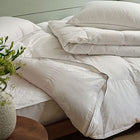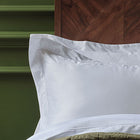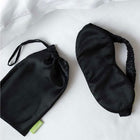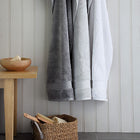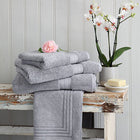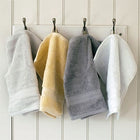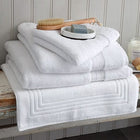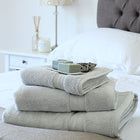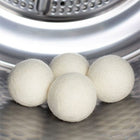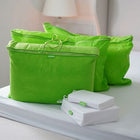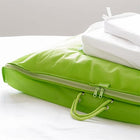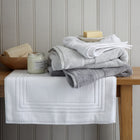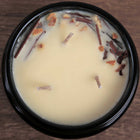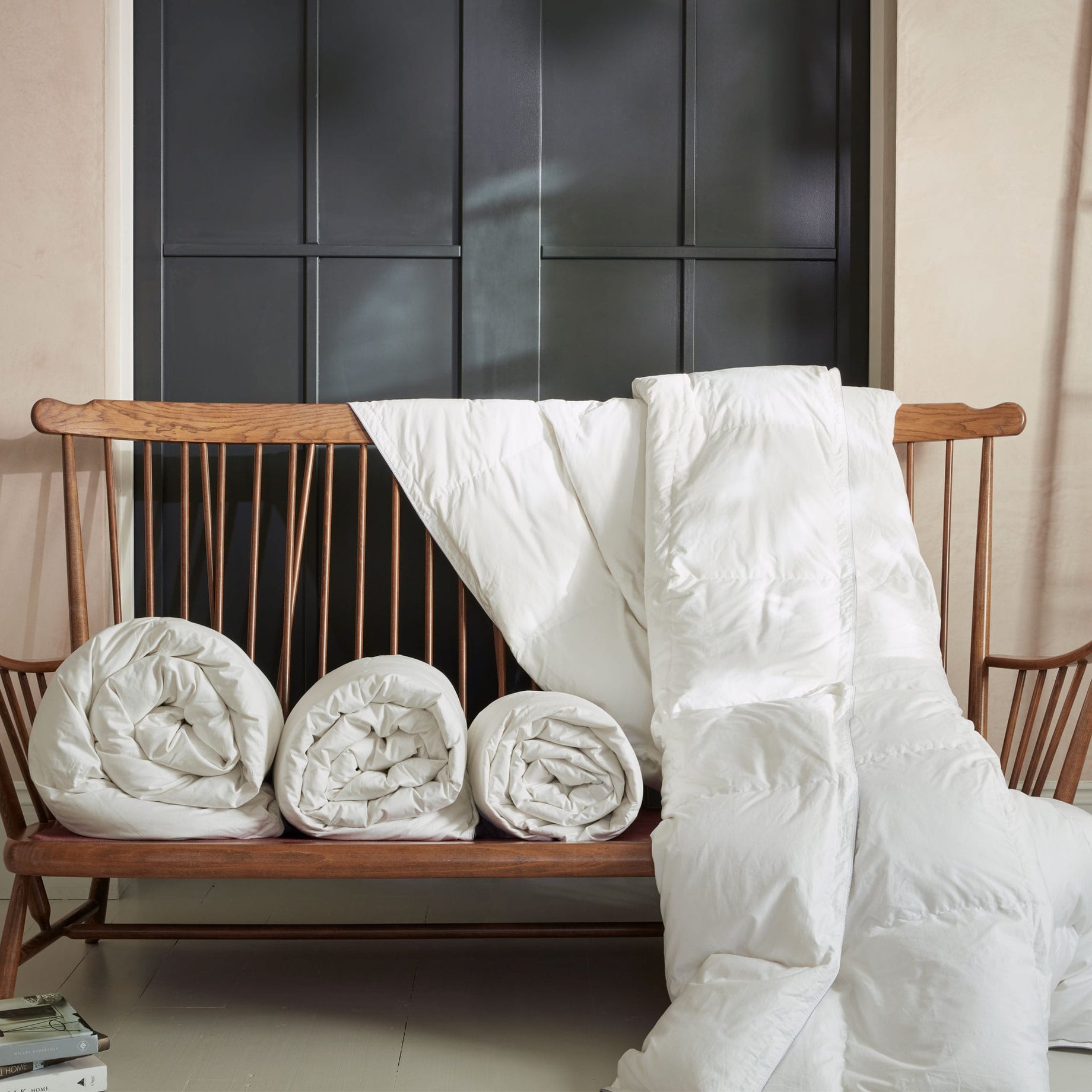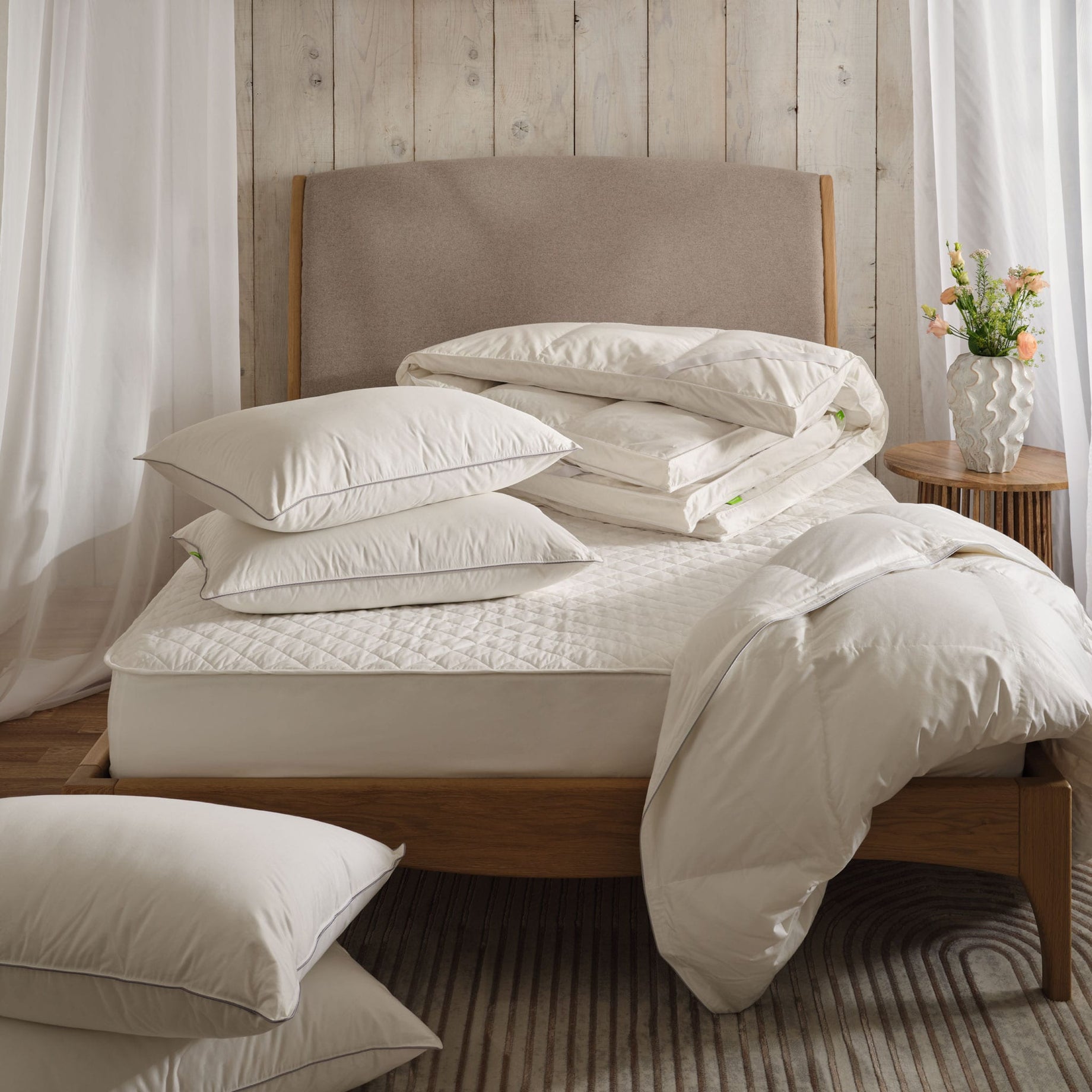
What is the best duvet tog? Our guide to duvet tog ratings
Duvet tog explains how warm a duvet is by measuring the thermal insulation using a rating scale of 1 tog to 15 tog. The higher the tog, the warmer the duvet will be and the lower the tog, the cooler the duvet.
The best duvet tog depends on the season: a 2.5 tog duvet to 4.5 tog duvet for warmer summer weather; a 9 tog duvet to 11.5 tog duvet for moderate temperatures in spring, autumn and winter; and a higher 13.5 tog duvet for very cold winter nights.
If you only want to buy one duvet to use all year round, an all seasons duvet, also called a 3-in-1 duvet, provides 3 temperature options and is more cost-effective.
Read on to have all your duvet tog rating questions answered:
- Duvet tog chart - duvet tog ratings explained
- What tog duvet should I buy?
- What tog duvet is best for the winter?
- What tog duvet is best for the summer?
- Which duvet tog are Emily and Jonathan using today?
- What tog is an all seasons duvet?
- What tog duvet is best for a toddler or child?
- Do wool or silk duvets have tog ratings?
- What does tog stand for?
- Other things to think about when choosing a duvet
Duvet tog chart
Duvet togs explained - Here is our 'what tog is right for me chart' so you can quickly find the best duvet tog rating for you:
Best duvet tog
What tog duvet should I buy? There isn’t really a ‘best duvet tog', as it depends on your personal sleeping preference and your bedroom temperature. Having the right tog duvet is important however, because if you’re too hot or too cold in bed, you won’t get a good night’s sleep.
Your body temperature needs to decrease slightly before you can fall asleep. A comfortable 18°C/ 65F is the ideal temperature for your bedroom at night. Your duvet should be the right tog rating for the season and also suit your natural sleeping temperature.
One of the most versatile options is an all seasons down duvet which is made up of two duvets, a lighter tog duvet and a warmer tog duvet, which can be fastened together if needed. A 13.5 tog duvet (4.5 tog plus 9 tog), is the most common all season duvet tog combination. An all seasons duvet set can be a great option to use all year round and often comes with a cost saving. See our guide.
Best duvet tog for the winter
A 9 tog down duvet to 11.5 tog down duvet is perfect for the spring and autumn months, and if your house is warm and well insulated, a 9 tog duvet will also suit you during the winter months. If you like to be really warm or your house is cold and draughty during the winter, then a 13.5 tog duvet will be right for you.
Best duvet tog for the summer
A 2.5 tog down duvet or a 4.5 tog down duvet are ideal summer duvet togs. If you are a hot sleeper or have night sweats, you may want a 4.5 tog duvet for the cooler months and a 2.5 tog duvet for the warmer summer months.
Which duvet tog are Emily and Jonathan using today?
The night temperatures in the UK have been a bit mixed so far this autumn, ranging from around 5°C to 12 °C, so we are currently using our 4.5 tog duvet. Emily feels just right but Jonathan could already be snuggling under a cosier 9 tog duvet! We won't however be changing our duvet tog until it gets below 5°C.
If you and your other half can't agree, then you could instead follow the Scandinavian duvet method where couples share a bed but each use their own different tog duvet. This allows each person to customise their sleep environment, reducing sleep disruption and probably improving marital / partner relations!
Emily has put together this duvet tog chart to help you decide which tog is currently best for you.
Our duvet tog guide
What tog is an all seasons duvet?
An ‘All seasons duvet’ can be a great choice. Made up of two duvets, one a less insulating lower tog duvet and the other a higher and warmer tog duvet. An all season duvet usually combines a 4.5 tog duvet with a 9 tog duvet that can be easily fitted together to make up a 13.5 tog, providing great temperature regulation for any season. Read more in our guide.
At Scooms, we offer three different All seasons duvet combinations:
- 13.5 tog duvet - 4.5 tog plus 9 tog.
- 11.5 tog duvet - 2.5 tog plus 9 tog.
- 7 tog duvet - 2.5 tog plus 4.5 tog.
Our all seasons duvets come with really easy to use fasteners so that you can fix the two duvets together to create a warmer tog duvet if you desire. So you can choose the perfect warmth for you, whatever the temperature. All our duvets comes in a handy material bag so you can easily store one duvet while you use the other.
(Note, if you are planning to pack your duvet away in a storage bag after several months of use, we recommend airing your duvet for 48 hours or washing it to make sure there is no moisture lurking in the natural down and feather filling. As this can result in the filling clumping and 'disappearing' from the duvet pockets. See our guide: How to store your duvet.)
All Scooms duvets come with matching hand stitched buttonholes so that you can buy one duvet first and then add another duvet at a later date if you wish to. (Just email us to request some fasteners).
Duvet tog guide for children
What duvet tog is best for a toddler or child? As children have smaller bodies, a duvet will trap more air around their body and keep them warmer at a low tog rating.
Toddlers and children, particularly under the age of ten, should use a lightweight single size 2.5 tog duvet or 4.5 tog duvet throughout the year. If they feel chilly, then add a light blanket rather than swapping to a higher tog duvet.
Babies under 12 months are too young for duvets and pillows due to the risk of overheating. If your child is younger than 12 months, you need to ensure that they sleep under a blanket or in a sleeping bag specifically designed for their age.
Wool or silk duvets
Wool duvets are not measured using the tog rating system. Instead, the warmth of a wool duvet is generally measured in gsm (grams per square metre): 200-300gsm feels like a 4.5 tog, 400-500gsm feels like a 7-9 tog and 600-700gsm feels like 10-13.5 tog. Sometimes only the applicable season is stated rather than the gsm, such as spring, summer, winter or all-season.
Similarly, as silk duvets can’t be measured by tog, they’re measured in grams of silk per square metre (gsm). As a guide, 250gsm filling is similar to a 2-4 tog rating, 400gsm is about a 7-9 tog rating, while 600gsm is equivalent to 10-13 tog.
Duvet filling comparison table: down, wool & silk
| Duvet Season | Down TOG Rating | Wool / Silk GSM |
| Summer | 2 - 4 tog | 200-300 gsm |
| Spring, Autumn, Winter | 7 - 9 tog | 400-500 gsm |
| Deep winter | 10 - 13.5 tog | 600-700 gsm |
| All seasons set | 13.5 tog (4.5 + 9 tog) | 800-900 gsm |
What does Tog stand for?
Tog is a word, not an acronym, so it doesn’t actually stand for anything. The ‘tog’ or duvet tog scale is a measure of thermal resistance of a specific area (typically a square metre). The Tog rating scale (duvet tog scale) was set up in the 1940s by the Shirley Institute in Manchester to provide an easy to follow scale showing a material’s thermal insulation. This ascending tog scale, starting at a cool 1.5 tog to a very toasty 15 tog, shows how good a duvet is at trapping air and therefore providing warmth.
If you want a more scientific explanation, then: The SI definition of a tog is 0.1 m2⋅K/W. (SI is The International System of Units, which defines metric measurements). In other words, the thermal resistance in togs is equal to ten times the temperature difference in degrees C between the two surfaces of a material, when the flow of heat is equal to one watt per square metre. Phew…!
Essentially, the duvet tog rating is a scale measuring how good a duvet is at retaining heat. (Note, it doesn't measure the thickness of a duvet.)

Some common duvet TOG questions:
- What tog duvet do I need?
At Scooms we suggest the following tog: 2.5–4.5 tog for summer, 4.5–9 tog for spring/autumn, 9–13.5 tog for winter. - Does a higher tog mean a heavier duvet?
This depends on the quality of the filling. A higher tog duvet will have more filling than a lower tog duvet with the same filling type and so will be a little heavier. However, a down duvet will be lighter than a wool duvet or feather duvet for the same tog rating. - Is a 10.5 tog warm enough for winter?
Yes, we recommend a 9 tog to 13.5 tog for winter. - What is the tog rating for a winter duvet?
The typical tog rating for a winter duvet would be a 9 tog duvet to a 13.5 tog duvet. - What tog is best for a summer tog duvet?
A 2.5 tog duvet to 4.5 tog duvet would be ideal for a summer duvet. - What is the best tog for an autumn duvet?
We would suggest a 4.5 tog duvet to 9 tog duvet depending on how warm you are while you sleep. - Is a 9 tog duvet warm enough for the winter?
Yes, many Scooms customers use a 9 tog for the winter. If the temperature gets really cold, you may want an all seasons duvet so that you can combine two duvets to make up a 13.5 tog all seasons duvet. - What tog is an all seasons duvet?
An all seasons duvet is made up of two duvets, usually a 4.5 tog duvet and a 9 tog duvet, that can be combined together to make a 13.5 tog duvet. - Is a 15 tog duvet too warm?
Yes, they are too warm for most people. - What tog duvet do hotels use?
Hotels generally use a 9 tog. If you are staying in a luxurious hotel, they may give you a choice of duvet weights. - What is a quilt tog rating?
Quilt, comforter and duvet insert are typically US terms for a duvet, so a quilt tog rating will be the same as a duvet tog rating. - What’s the highest tog duvet?
You can get duvet togs up to a rating of 18 tog. This will feel incredibly warm! Great if you live in a tent in the Arctic! Generally 13.5 is the highest tog duvet you can get.
Other things to think about when choosing a duvet
Tog ratings for duvets is just one of the four main things you need to consider when you choose a down & feather duvet. The 3 other important duvet elements are:
- The duvet filling - The material used to fill the duvet such as down or wool.
- Fill power & weight - Fill power measures the volume taken up by the down or feather filling in a duvet and fill weight measures the weight of the filling.
- How the duvet is made - The construction of a duvet is also important to make sure the filling stays well distributed and doesn’t bunch up leaving part of you rather cold during the night.
Find out more in our How to choose a duvet guide.
